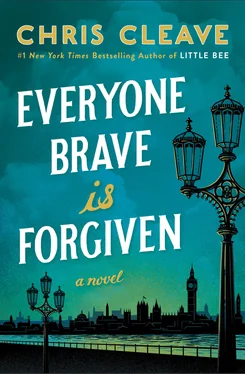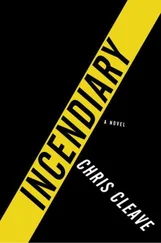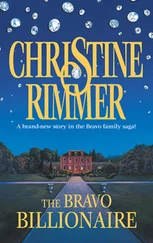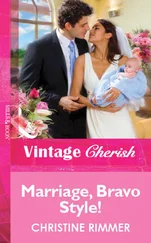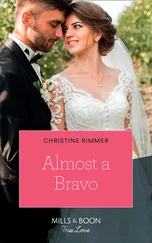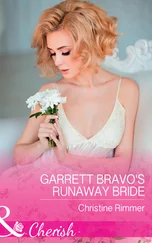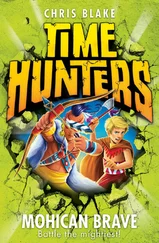The quick April clouds sent white and gray shades through the room.
“Your father was my choice. You were my delight. You may despise my life for its smallness — it may seem as nothing to you — but please do not think it is nothing to me. And the smaller it becomes, the more frightening I find it, because all that is left is so dear.”
Her mother had tears in her eyes, but Mary could not feel a thing.
MARY WALKED TO THE Lyceum, limping on her left leg. The craters in the Strand were a bore, but the wags had put up signs beside the deepest: GRAND CANYON, and JOURNEY TO THE CENTER OF THE EARTH, TWO SHILLINGS AND SIXPENCE. London slipped by with no trouble, parting its late-morning crowds around her. It smelled of all the smokes promiscuously: cigarette, pipe, locomotive, house coal, and roof joist. At the theater the huge portico was pocked by shrapnel but otherwise unharmed. The manager told her that Zachary was out, but Mary went down to the basement anyway, since she supposed he could not stop her. He would hardly lay hands on her.
Underground, the empty dance floor was sticky with sweat and beer. The electric bulbs — their array much degraded — interfered with the fraying light of the morphine. She had a small jolt of feeling, but it didn’t have to last. She picked her way between the unmatched tables and chairs. The basement was deserted but there were children’s voices coming from the bar on the far side. She made her way over.
The bar was of rough wood and everywhere reinforced, a certain amount of dancing upon it being inevitable. In their racks the glasses were of the indestructible variety. She missed the lightness of things — the jeu d’esprit in which the stuff of the world had once been made as finely as possible, in anticipation of forces falling within a mannered range. She put down her bag and dug out a bottle of morphine. She took a dozen drops and lit a cigarette, listening to the children’s voices. She peered over the bar top.
“Can’t a person get any service around here?”
Zachary’s head emerged over the counter.
He gave her a cautious look. “Are you angry?”
“Not at all. Did you get my letter?”
He shook his head. “I thought you hated me.”
“Should I? You probably saved my life.”
A colored girl’s head appeared over the bar. She was seven if Mary had to guess, with gapped teeth and a minor squint. “I’m Molly.”
“I know,” said Mary.
“How?”
“Because you just told me.”
Molly grinned. “Do you want to wobble my tooth?”
“Thank you, I should love to.”
It was a premolar in the lower jaw and it did have a good wobble to it. It was immensely satisfying to nudge it to and fro. Sound the air-raid warning, thought Mary. We are losing our milk city . Molly chattered away. Mary gathered that she had lost her parents, and that the minstrels were supporting her and Zachary. Both children seemed to accept this as natural.
“How many ration books do you have between you?” said Mary. “Really? None at all?”
“We eat down here,” said Zachary.
“What, exactly? You’re both awfully thin.”
“Biscuits. Bread. Whatever they’re selling.”
“Really? People come in here and take money from children for food?”
“And milk and sweets.”
“When was the last time you ate eggs, meat, or fruit?”
Molly’s lip began to tremble. “Are we in trouble?”
“Only from scurvy.”
She grabbed each of them by an arm and marched them up to the alleyway. The children blinked and screwed up their eyes against the light. Zachary had on a stained white shirt and a black bow tie. He needed seven kinds of haircut.
“You mustn’t tell Molly I can’t read and write,” he whispered.
Mary looked over at her. The girl wore a purple dress with white bows. She was staring at the sky as if it might be ordered away.
“Would she mind?” said Mary.
“I told her I was clever. You know — so she’d stay.”
Mary smiled. ‘It doesn’t work like that.”
“How does it work?”
“People stay if they can.”
He squinted up at her. “Are you all right?”
“Fine, thank you.”
The dark look boys gave to a pale answer. Years went by. Feelings almost came. The war ended, and saplings grew through the rubble.
Mary blinked. It was the morphine that sent time in these meandering rivers, orphaning a loop without warning and leaving it isolated, a little oxbow of memory with no clue of how it had got there. She was seeing the look with which Zachary had dismissed her, on the day of the evacuation. In his face as he flicked away his imaginary cigarette had been this same hint of a sadness evolved beyond consolation. As if misery, winged and pelagic, had left behind the doughy shore and its brood of flightless comforts.
She had the children wait in the alleyway while she flagged down a cab on the Strand. When the driver stopped she held the door and the children piled in. In his rearview mirror the driver’s face was a picture.
He said, “Where are we taking the piccaninnies?”
“To Piccadilly. Where else? The Ritz.”
“It’s your neck,” said the driver.
Molly put her head on Zachary’s shoulder and fell asleep. He looked out at the city. The driver watched them in the rearview mirror with an expression of perfect disgust. When it became tedious, Mary gave the man a bright smile and said, “They are from Timbuktu, you know. I got them for six strings of colored beads and a daguerreotype of the King. Didn’t I do well?”
The driver reddened. “I would of kept the beads.”
“I would have kept the beads,” said Mary, and now the man made them get out and walk the last half mile.
“I thought I was the stupid one,” said Zachary.
Mary gave him a wounded look. “Yes, but it is absolutely your fault for being as black as pitch, don’t you see?”
He smiled, for the first time that day. “Why did you come?”
She nodded in the direction of Molly, who was skipping ahead. “I was jealous of the attention you were getting.”
“But really?”
“I thought you might be lonely.”
“I’ve got Molly to look after.”
Fine, she thought, but would you mind awfully if I stuck around anyway?
At the Ritz her father’s name was good enough for a table, despite the unconcealed anguish of the staff from the headwaiter down. Mary and the children were seated for lunch as far from the other guests as the great dining room permitted, but even so a couple objected and required to be moved to a more distant table. Mary gave them a wave.
“They’re mine,” she explained loudly. “From different fathers, I think — one loses track.”
“Madam,” said the waiter, “I must ask you to consider our guests.”
“Waiter,” said Mary, “I must ask you to bring us Tamworth ham, cheeses of the mild sort, bread rolls, diced avocado pears with lemon so they don’t go brown, Cumberland sausages, hard-boiled eggs thinly sliced, scones with and without currants, fruit jams but please not peach, cocoa but not too hot, two large oranges, and two large apples in not too big slices.”
“Cox’s or Granny Smith, madam?” asked the waiter, recovering.
“As they come. Oh, and coffee. Oh, and an ashtray.”
“Very good. Will there be anything else?”
“That will depend,” said Mary, “on whether anyone is sick.”
“Very good, madam.”
The children watched with wide eyes as the waiter receded.
“Are we even allowed in here?” said Zachary.
“It’s this place that shouldn’t be allowed. Your only crime is hunger.”
Читать дальше
